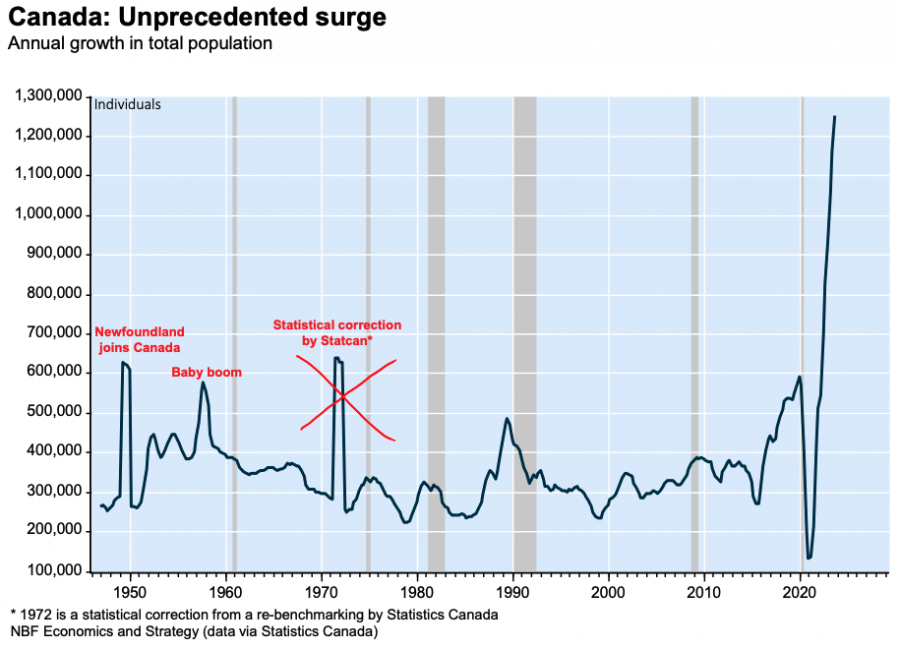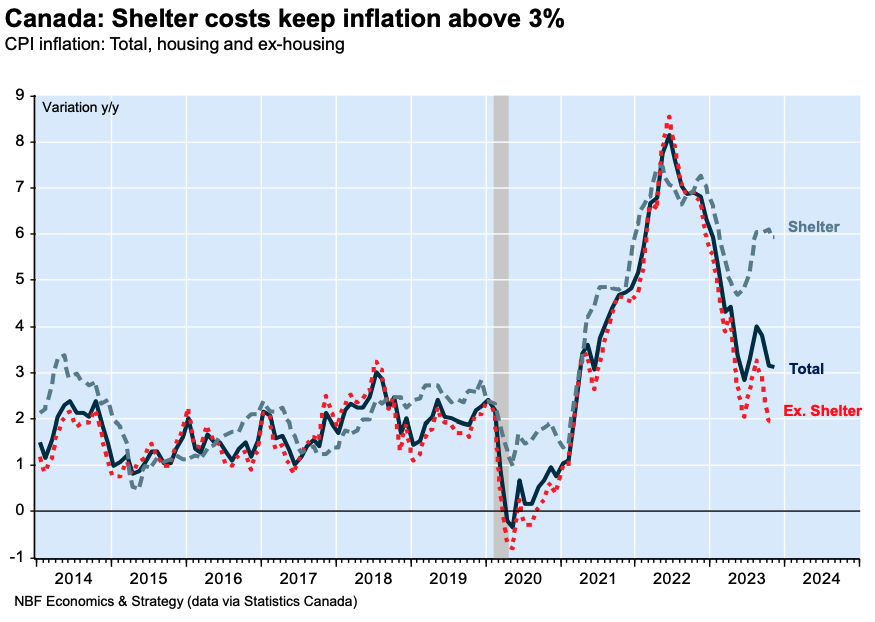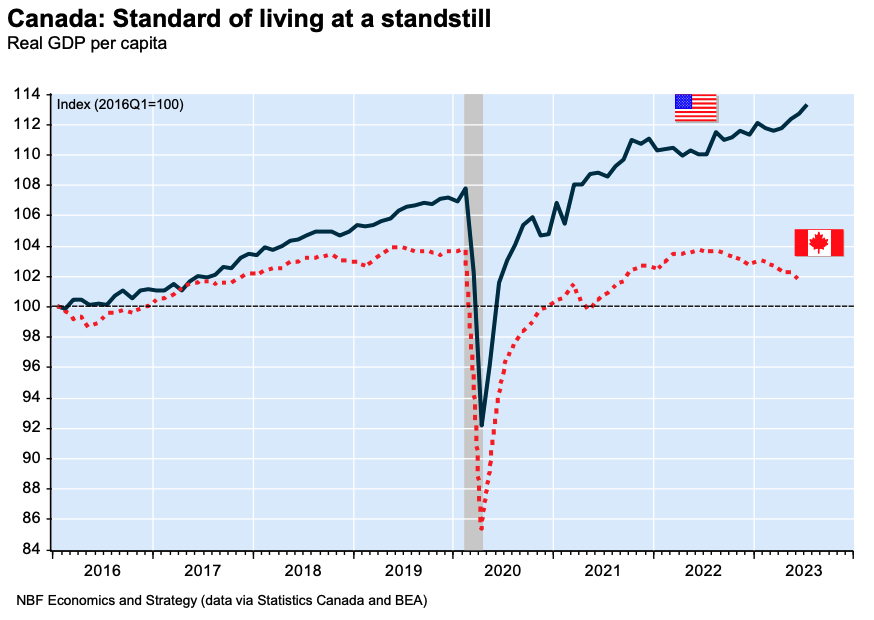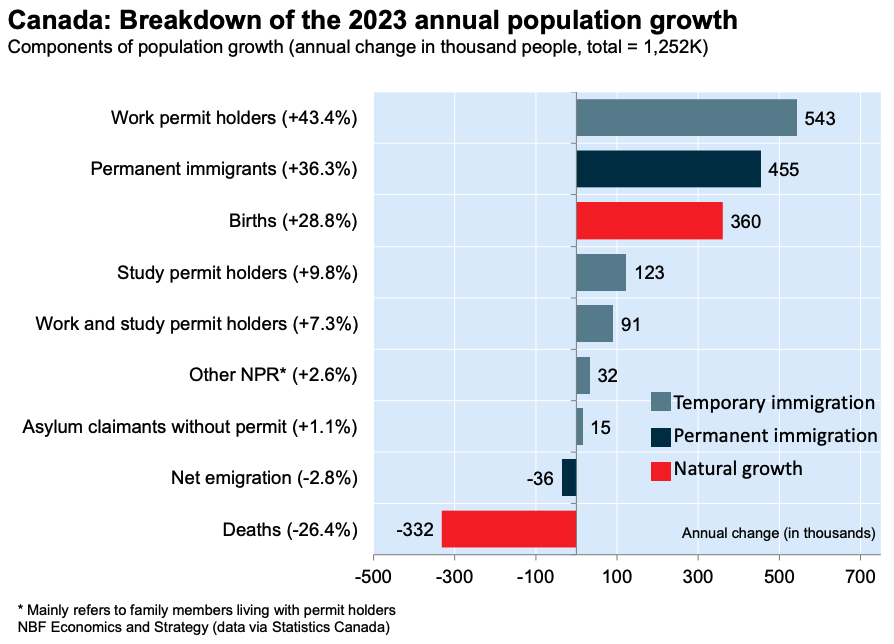Canada is stuck in a “population trap” after a “staggering” number of immigrants moved to the country in recent years, a major bank has warned.
Pointing to last year’s record-breaking population growth – an increase of over 1.2 million, with the national total now estimated to be about 40.8 million – the National Bank of Canada says the situation is so “extreme” that it is hurting the country’s economy.
The bank’s report explains that Canada is in a population trap for the first time in modern history, meaning that no increase in living standards is possible because the population is growing too fast.
Its publication comes amid an ongoing national debate about how many immigrants Canada can, and should, take each year.

The federal government said late last year that it wants to bring in 485,000 new permanent residents in 2024, then 500,000 in 2025; students and temporary workers make up most of the rest of the numbers.
That plan “prioritizes economic growth,” the government said then, while last week Finance Minister Chrystia Freeland said much the same, adding: “Canada has the social capacity to welcome immigrants.”
The National Bank of Canada’s report, however, disagrees with these assertions.
“Keep in mind that Canada's population increased by more than 1.2 million in 2023, an incredible number given that it followed a rebound of 825,000 in 2022 after the Covid recession,” researchers Stéfane Marion and Alexandra Ducharme explain.

“These are staggering numbers when you consider that prior to this, you would have to go back to 1949, when Newfoundland joined the federation, to see our country's population increase by more than 600,000 in one year.”
They add: “To put things in perspective, Canada's population growth in 2023 was 3.2 per cent, five times higher than the OECD average ... Our country's current population growth appears extreme relative to the absorptive capacity of the economy and the fact that our workforce is not aging faster than the OECD average.”
The struggle to absorb the large number of arrivals is most evident in housing, the report says.
It points to a record deficit in housing starts per person entering the workforce – one start for every 4.2 new workers (the historical average is one new worker per 1.8 starts).

It says that, to meet demand and slow down price rises in housing, Canada would need to double its construction capacity to 700,000 homes per year, a number it dismisses as an “unattainable goal.”
“In any case, our policymakers need to go beyond simply targeting housing supply and recognize that above a certain number, population growth is an impediment to our economic well-being,” it argues.
“The fact that real GDP per capita has been at a standstill for six years is a case in point."
The country does not have enough savings to stabilize the economy and achieve an increase in GDP per capita, the report says.

“Simply put, Canada is in a population trap for the first time in modern history,” the authors explain.
“More worrisome is the fact that the decline is not simply due to a lack of housing infrastructure. In fact, the private non-residential capital stock to population ratio has been declining for seven years and is currently no higher than it was in 2012, while it is at a record high in the US.”
To fix the economic malaise, the authors say, the federal government should ensure population growth does not exceed “300,000 to 500,000" – a cut of up to 75 per cent compared with 2023's figures.
Data released last month, however, show Canada's population was growing by more than 140,000 people every month last year.
Last week, meanwhile, Conservative Party leader Pierre Poilievre said he would link immigration numbers to housing builds if he became prime minister.
Also last week, The Canadian Press said it had obtained documents showing the federal government was warned by public servants that surging immigration could have a negative effect on housing affordability and put pressure on services such as healthcare.
The government was also told that high levels of immigration do not increase GDP per capita.

“Canada is caught in a population trap that has historically been the preserve of emerging economies,” the National Bank of Canada report explains.
“We currently lack the infrastructure and capital stock in this country to adequately absorb current population growth and improve our standard of living.
“Our policymakers should set Canada's population goals against the constraint of our capital stock, which goes beyond the supply of housing, if we are to improve our productivity.”
The report's central message has been delivered by economists at numerous Canadian banks over recent months, including TD and CIBC.
In December, Bank of Canada Deputy Governor Toni Gravelle also waded into the debate, saying that high levels of immigration had coincided with slow housebuilding and driven up rents and house prices.
"Canada’s housing supply has not kept pace with recent increases in immigration," he explained. "This is different from the United States, where housing construction has been more flexible to respond to population shifts and where rent inflation is expected to continue to decline."





















